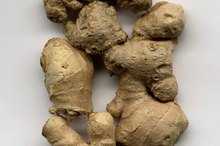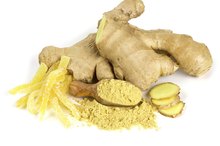How to Use Ginger Root to Stop Smoking
Smoking cigarettes is an addictive habit that kills thousands of people each year. There are over 4,000 dangerous chemicals in cigarettes,. Those who smoke are at increased risk of a host of degenerative diseases including cancers, cardiovascular problems, skin disorders, lung damage and tooth and mouth decay to name a few. Quitting can be a difficult task, however, natural substances such as ginger are found to be helpful in some cases. Consult a doctor before using herbs.
Take a quit smoking aid that includes ginger. Many natural and herbal quit smoking aids include ginger ingredients because of its ability to help ease nausea. Nausea is a noted symptom of nicotine and cigarette withdrawal. Always follow the manufacturer's instructions for use.
Ginger Root for the Lungs
Learn More
Consume a ginger capsule. Ginger can be purchased dried and ground in capsule form. Ingesting pure ginger in this way could support a plan to quit smoking, because ginger has a warming and heating effect in the body, which promotes perspiration 1. Sweating is a natural way for the body to excrete toxins and thus may help relieve some chemical load from the body as it detoxifies from the cigarette addiction.
Drink ginger tea. While quitting smoking there will often be times when a craving arises that is difficult to ignore. Instead of smoking a cigarette in these times, prepare a cup of hot ginger tea. This action is effective because it helps form a new habit in place of the old one. In addition to acting the body from wanting a cigarette, the qualities of the ginger will further assist detoxification and ease any nausea the quitter may be feeling at the time.
Warnings
Speak to a doctor about appropriate dose and use instructions when attempting to use ginger to quit smoking.
Related Articles
References
- ''Staying Healthy With Nutrition: The Complete Guide to Diet and Nutritional Medicine''; Elson M. Haas, MD; 2006
- Ryan JL. Treatment of chemotherapy-induced nausea in cancer patients. Eur Oncol. 2010;6(2):14-16.
- Marx W, Ried K, McCarthy AL, et al. Ginger-mechanism of action in chemotherapy-induced nausea and vomiting: A review. Crit Rev Food Sci Nutr. 2017;57(1):141–146. doi:10.1080/10408398.2013.865590
- Panahi Y, Saadat A, Sahebkar A, Hashemian F, Taghikhani M, Abolhasani E. Effect of ginger on acute and delayed chemotherapy-induced nausea and vomiting: a pilot, randomized, open-label clinical trial. Integr Cancer Ther. 2012;11(3):204–211. doi:10.1177/1534735411433201
- Haniadka R, Rajeev AG, Palatty PL, Arora R, Baliga MS. Zingiber officinale (ginger) as an anti-emetic in cancer chemotherapy: a review. J Altern Complement Med. 2012;18(5):440–444. doi:10.1089/acm.2010.0737
- Arslan M, Ozdemir L. Oral intake of ginger for chemotherapy-induced nausea and vomiting among women with breast cancer. Clin J Oncol Nurs. 2015;19(5):E92–E97. doi:10.1188/15.CJON.E92-E97
- Bossi P, Cortinovis D, Fatigoni S, et al. A randomized, double-blind, placebo-controlled, multicenter study of a ginger extract in the management of chemotherapy-induced nausea and vomiting (CINV) in patients receiving high-dose cisplatin. Ann Oncol. 2017;28(10):2547–2551. doi:10.1093/annonc/mdx315
- Palatty PL, Haniadka R, Valder B, Arora R, Baliga MS. Ginger in the prevention of nausea and vomiting: a review. Crit Rev Food Sci Nutr. 2013;53(7):659-69. doi:10.1080/10408398.2011.553751
- WholeHealth Chicago. Ginger. Updated May 12, 2009.
- Oncology Nutrition: a Dietetic Practice Group of the Academy of Nutrition and Dietetics. Dietary supplements.
- Marx W, Mckavanagh D, Mccarthy AL, et al. The effect of ginger (Zingiber officinale) on platelet aggregation: a systematic literature review. PLoS ONE. 2015;10(11):e0143675. doi:10.1371/journal.pone.0141119
- Chuah SK, Wu KL, Tai WC, Changchien CS. The effects of ginger on gallbladder motility in healthy male humans. J Neurogastroenterol Motil. 2011;17(4):411-5. doi:10.5056/jnm.2011.17.4.411
- National Center for Complementary and integrative Health. Ginger. Updated November 30, 2016.
- Bossi, P., Cortinovis, D., Fatigoni, et al. A Randomized, Double Blind, Placebo-Controlled, Multicenter Study of a Ginger Extract in the Management of Chemotherapy Induced Nausea and Vomiting (CINV) in Patients Receiving High Dose Cisplatin. Annals of Oncology. 2017. 28(10):2547-2551.
- Haniadka, R. et al. Zingiber officinale (Ginger) as an Anti-Emetic in Cancer Chemotherapy: A Review. Journal of Complementary and Alternative Medicine. 2012.18(5):440-4.
- Jordan, K., Jahn, F., and M. Aapro. Recent developments in the prevention of chemotherapy-induced nausea and vomiting (CINV): a comprehensive review. Annals of Oncology. 2015.26(6):1081-90.
- Pillai, A. et al. Anti-emetic effect of ginger powder versus placebo as an add-on therapy in children and young adults receiving high emetogenic chemotherapy. Pediatric Blood and Cancer.2011.56(2):234-8.
Writer Bio
Leah Webber began writing professionally in 2010. She contributes pro bono articles for the health section of a local community newspaper in her native Vancouver, British Columbia. Webber is pursuing her diploma as a registered holistic nutritionist at the Canadian School of Natural Nutrition.









